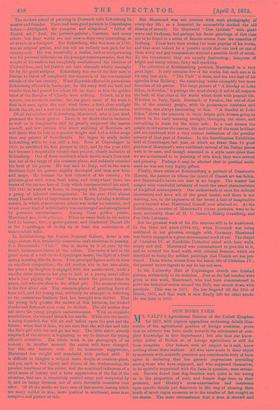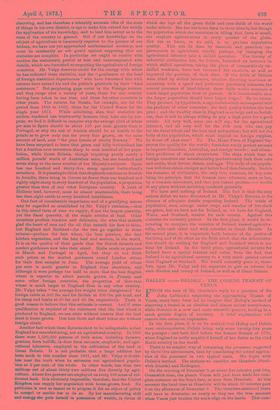OUR HOME FARM.
ATR. VALPY'S Agricultural Returns of the United Kingdom 1.11 for 1872, with copious appendices embracing details illus- trative of the agricultural position of foreign countries, prove that an advance has been made towards the attainment of com- plete knowledge in this department ; but also that our know- ledge either of British or of foreign agriculture is still far from complete. Our fathers, with all respect be it said, knew nothing about those matters. All who have made it their object to ascertain with scientific precision any considerable body of facts agree in declaring that the general impressions prevailing among those who were .supposed, and who supposed themselves, to be specially acquainted with the facts in question, were errone- ous. Darwin found that dog-breeders were quite in the wrong as to the proportion of male and female dogs born on their premises, and Huxley's cross-examination and insistence upon specific details put fishermen in the way of clearing their heads of much vague nonsense as to the number of fish caught on our shores. The mere circumstance that a man is shrewd and
observing, and has therefore a tolerably accurate idea of the state of things in his own district, is apt to make him extend too widely the application of his knowledge, and to lead him astray as to the state of the country in general. But if our knowledge on the subject of agriculture is immensely superior to the guesses of our fathers, we have not yet approached mathematical accuracy, and must be constantly on our guard against supposing that our statistics are complete. In particular we ought to receive with caution the statements, partial at best and unaccompanied with details, which are furnished us respecting the agriculture of foreign countries. Mr. Valpy deserves credit for the energy with which he has collected these statistics, and the "gentlemen at the head of foreign statistical departments" who have furnished him with returns have earned his and the public's gratitude by their "kind assistance." But perplexing gaps occur in the Foreign returns, and they range over a variety of years, those for one country having been taken in one year, and those for other countries in other years. The returns for Russia, for example, are for the period from 1859 to 1863, those for the United States for the single year 1872. While admitting, also, that statistics are seldom rendered less trustworthy because they take one by sur- prise, we find it difficult to imagine why the average yield of wheat per acre in Spain should be about 150 per cent. greater than in Portugal, or why the soil of Austria should be so hostile to the potato as to grow only one for every four grown, on the same amount of land, near "the pine forests of wintry Norway." We have been surprised to learn that green and hilly Switzerland has but a fraction over seventeen sheep to each hundred of her popu- lation, while Great Britain, though requiring yearly nearly a million pounds' worth of Australian meat, has one hundred and seven sheep to the same number of her Majesty's subjects. Spain has one hundred and thirty-five sheep against Switzerland's seventeen. It is pleasing-to think that shepherds continue to flourish in Arcadia, there being in Greece no fewer than one hundred and eighty-eight sheep to every hundred of the population, a proportion greater than that of any other European country. A joint of Hellenic beef, however, must be almost unattainable, there being less than eight cattle to every hundred inhabitants.
One fact of considerable importance and of a gratifying nature may be regarded as established by Mr. Valpy's statistics,—that in this island farm of ours we supply, if not the largest quantity, yet the finest quantity, of the staple articles of food. Other countries produce luxuries and delicacies, the wine that maketh glad the heart of man and the oil that causeth his face to shine, but England and Scotland —for the two go together in these returns—produce the best wheat, the best potatoes, the best kitchen vegetables, and the best beef and mutton, in the world. It is on the quality of their goods that the British farmers and market gardeners now take their stand. Malta sends us potatoes in March and Portugal in April, but they do not fetch such prices as the market gardeners round London obtain for their first samples in June. The average yield of wheat per acre is much greater in England than elsewhere, and although it were perhaps too bold to state that the best English wheat is superior to select parcels grown in Prussia and some other foreign countries, the proportion of first-rate wheat is much larger in England than in any other country. Mr. Valpy takes "the average live weight when slaughtered" for foreign cattle at 500 lbs. and for British at 600 lbs. per head, and for sheep and lambs at 60 lbs. and 60 lbs. respectively. There is good reason to believe that this estimate is correct. And if some qualification is required of the statement that the best wheat is produced in England, we can state without reserve that the beat meat is home-grown. Our best Scots and short horns are without foreign rivals.
Another fact which these Returns show to be indisputable is that England iaa manufacturing, not an agricultural country. In 1861 there were 1,590,000 persons of both sexes, including farmers, graziers, farm bailiffs, in-door farm servants, shepherds, and agri- cultural labourers, employed in the cultivation of the land in Great Britain. It is not probable that a large addition has been made to this number since 1861, and Mr. Valpy is doubt- less near the truth when he estimates our agricultural popula- tion at 6 percent. of the whole. In other words, less than two millions out of about thirty-two millions live directly by agri- culture. About five persons are employed on every 100 acres of cul- tivated land. It is obviously impossible, therefore, that the United Kingdom can supply her population with home-grown food. No politician, 'is now so insane as to propose it for an object of policy to compel or enable. her to do so. By her manufacturing skill and-energy she puts herself in possession of wealth, in virtue of which she lays all the green fields and corn-fields of the world under tribute. She has her home farm in these islands, but though the population which she maintains in tilling that farm is small, she employs agriculturists in every quarter of the globe. Her cue at home, as we said, is to produce superlative quality. This can be done by theoretic and practical itn- provements in agriculture, chiefly, perhaps, by changing the agricultural labourer into a skilled operative. The history of industrial civilisation has, we believe, furnished no instance in which skilled operatives, taking the place of comparatively un- skilled workmen, have not increased the numbers, as well as improved the position, of their class. If the fields of Britain were tilled by skilled labourers, whether directing machines or executing with a speed and perfection previously unknown the several processes of hand-labour, those fields would maintain a much larger population than at present. Is it inconceivable that the larger population should have larger wages? By no means. They produce, by hypothesis, a superlative article as compared with the products of other countries ; the best quality fetches the beat price ; and the wealthy class in England is so large and so fastidi- ous, that it will be always willing to pay a high price for a good article. All very well, some one will say, for the agricultural labourer, and all very well for the rich men who can pay for the finest wheat and the best beef and mutton ; but will not the body of the population, which must depend on foreign supplies, be worse off than ever ? No. The Home Farm of England im- proves the quality for the world ; furnishes rarely perfect animals to improve Canadian, Australian, and foreign breeds ; and stimu- lates producers of wheat everywhere. The ships which bear to foreign countries our manufacturing products carry back their corn and cattle, their butter, cheese, and eggs. The body of our popula- tion will thus obtain cheaper and better food than formerly. Such is the romance of civilisation, the only true romance, its key-note being the principle that the human race advances, more or less, by a common movement, and that you cannot produce real wealth in any place without enriching mankind generally.
We have said nothing of Ireland. The fact is that the only serious defect we have discovered in Mr. Valpy's Returns is the absence of adequate details respecting Ireland. The totals of population, area, acreage under crops, and number of live stock are given, but we have not for Ireland, as we have for England, Wales, and Scotland, returns for each county. Against this omission we earnestly protest. In the first place, it would be in- teresting to compare the counties of Ireland, viewed agricultu- rally, with each other and with counties in Great Britain. In the second place, it is important, both because of the justice of the thing and of its effect on the Irish mind, that the Administra- tion should do nothing for England and Scotland which is not done for Ireland. In the third place, agricultural returns for Ireland have a special interest and value, from the fact that Ireland is an agricultural country to a very much greater extent than England or Scotland. We would earnestly press it, there- fore, upon Mr. Valpy and his superiors to give us returns for each division and county of Ireland, as well as of Great Britain.



































 Previous page
Previous page